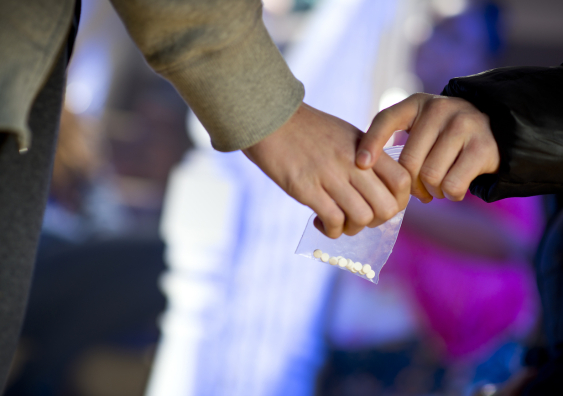Novel drugs are leading to rising overdose deaths in Victoria – drug checking services could help
Drug checking services could also provide an early warning system to flag any unusually dangerous substances in circulation.
Drug checking services could also provide an early warning system to flag any unusually dangerous substances in circulation.

Many of the harms people experience from using illegal drugs are a result of . Drugs may be contaminated, or completely substituted with something unexpected. They may also be of variable and unknown dosage or strength.
Any of these factors can and do lead to overdoses. That’s why are urging the Victorian government to implement drug checking services. These could reduce overdose deaths, and provide an early warning system to flag any unusually dangerous substances in circulation.
The Victorian statement adds to similar calls in other Australian jurisdictions. Notably, in New South Wales, a with his party to voice his support for the implementation of drug checking services.
In the , the number of new psychoactive substances detected in drug markets has increased dramatically around the world. It’s easier for suppliers to circumvent laws that prohibit more traditional drugs (such as cocaine, heroin, MDMA or methamphetamine) by producing newer synthetic drugs. These drugs are also often cheaper to produce.
They then get added to or sold as other more established drugs. This means people don’t always know what they’re taking, or how strong it is.
According to the , novel substances were detected in three deaths in 2017-18. This figure has risen significantly over the past five years, to 47 deaths in 2021-22.
Escalating deaths involving novel substances are being identified nationally. For example, there have been 40 deaths involving in Australia since 2015.
While harder to track, unexpectedly strong substances have been implicated in further deaths. In 2019, the investigated six deaths at music festivals resulting from consumption of unusually high-dose MDMA capsules. Last month, investigated a death that similarly followed consumption of an unexpectedly high-dose MDMA tablet.
Meanwhile, synthetic opioid drugs are causing an epidemic of in . Some of these novel opioids have recently been detected in Australia, including a new class called nitazenes, which have been identified in , , , and .
Often called “pill testing” in Australia, the term drug checking reflects that these services are inclusive of multiple drug forms (for example, powders and liquids in addition to pills) as well as multiple drug types (for example, cocaine, ketamine, heroin, methamphetamine and MDMA).
can be at a permanent location or mobile (for example, on-site at venues and festivals). People visit these facilities to find out the content and strength of drugs they plan to use, including whether they contain unexpected substances or higher-than-usual doses.
Service users also have the opportunity to discuss the test results in a meeting with a health-care worker, in a conversation about their broader drug use and health.
A recent analysing 90 studies found that drug checking services positively influenced the behaviour of people who use drugs.
In two recent studies conducted in and , most service users (86% in Portugal, 69% in the UK) who received test results indicating that the drug was different than expected didn’t consume the substance. About half of service users (50% in Portugal, 59% in the UK) whose test results indicated that their drugs were stronger than expected took a smaller dose.
Drug checking service data also provides real-time information about the status of local drug markets. Alerts can be published to rapidly warn people if an unusually dangerous substance is circulating. For example, the ACT drug checking service CanTEST has so far published alongside monthly drug market snapshot reports.
One argument levelled against drug checking is that such services provide a “” to drug use. But, as noted by an established drug checking service in , services never provide an endorsement of quality. Instead, they warn people how unpredictable drug markets can be by providing credible and relevant information.
Similarly, evidence doesn’t support claims that the availability of drug checking services leads to increased drug use. A recent that surveyed festival-goers about drug checking scenarios found the existence of a drug checking service wouldn’t increase intention to use ecstasy.
Drug checking services are now operating in , having expanded significantly around the world in recent years.
In 2021, passed legislation to make drug checking services fully legal.
Australia’s experience so far with government-sanctioned drug checking has included fixed-site and mobile , and recently-announced approval for drug checking services to . An interim report on a pilot in Canberra’s city centre supports the continuation and development of the service.
In Australia, the implementation of drug checking services has been recommended by numerous and , including the 2018 Parliament of Victoria and the into the death of six patrons at NSW music festivals.
In terms of public support, a found that in 2019, 63% of Australians supported drug checking. Some 22% were opposed while 15% were unsure or didn’t answer.
The Victorian statement demonstrates support from a wide range of social and community organisations. These include professional societies representing medical and pharmaceutical sectors, such as the and the .
Implementing drug checking will help prevent further overdose deaths that result from unregulated drug supplies.
![]()
, Vice Chancellor’s Senior Research Fellow, Social Equity Research Centre and Digital Ethnography Research Centre, and , PhD Candidate, Drug Policy Modelling Program,
This article is republished from under a Creative Commons license. Read the .